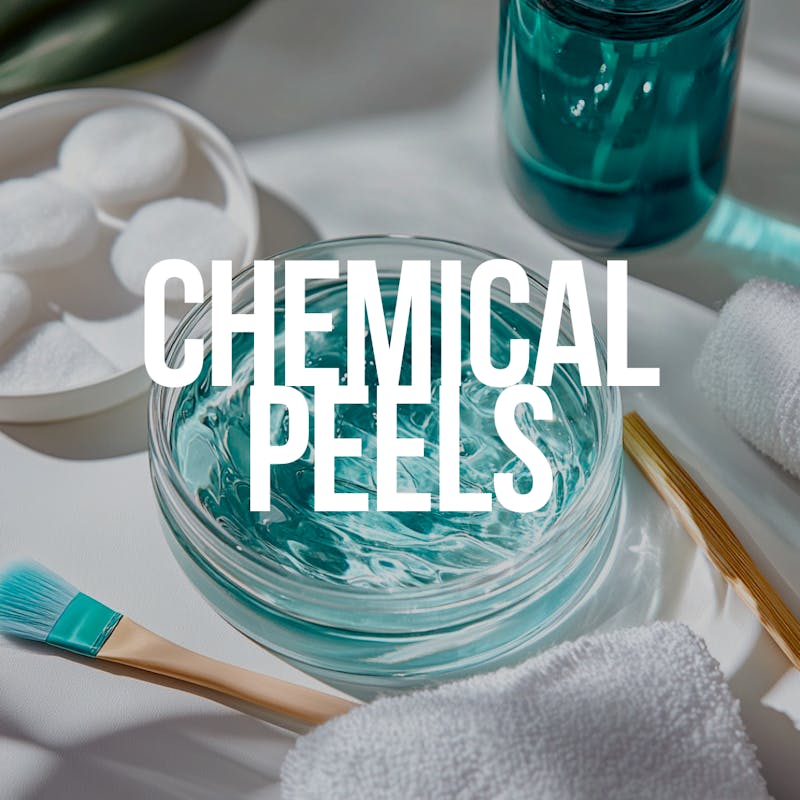
Chemical peels are a popular and effective way to improve skin texture, tone, and overall appearance. With so many chemical peels available, it can be challenging to know which one is right for you. In this blog, we’ll explore the different types of chemical peels, their benefits, the most common ingredients found in chemical peels, and why they are used.
What Are Chemical Peels?
A chemical peel is a skin-resurfacing procedure in which a chemical solution is applied to the skin to remove its outer layers. This exfoliation reveals a new layer of skin that is often smoother, more even-toned, and rejuvenated. Peels treat skin concerns like wrinkles, acne, hyperpigmentation, and more.
Types of Chemical Peels
-
Superficial Peels
- What They Are: Mild peels that use gentle acids like alpha-hydroxy acids (AHAs) or beta-hydroxy acids (BHAs) to lightly exfoliate the skin.
- Benefits: Best for improving texture, tone, and overall brightness with minimal downtime.
-
Medium Peels
- What They Are: Medium-depth peels that penetrate deeper into the skin using stronger acids like trichloroacetic acid (TCA).
- Benefits: Effective for treating moderate wrinkles, age spots, and acne scars. Expect a few days of peeling and downtime.
-
Deep Peels
- What They Are: Deep peels use potent acids like phenol to penetrate the deeper layers of the skin.
- Benefits: Deep peels dramatically reduce deep wrinkles, extensive sun damage, and precancerous growths, but they come with longer downtime and more significant risks, especially with phenol.
- Risks of Phenol Peels: Phenol peels are the most aggressive, and while they provide significant results, they can have serious side effects, including intense discomfort, prolonged recovery time, and the potential for heart and kidney complications. Phenol peels can also cause permanent skin lightening, making them unsuitable for darker skin tones. Because of this, phenolic peels are banned in many areas.
Common Chemical Peel Ingredients and Their Benefits
Chemical peels typically include a combination of acids and other active ingredients, each chosen for their ability to target specific skin issues. Here’s a list of the most common chemical peel ingredients and why they are used:
-
Glycolic Acid (AHA)
- Reason for Use: Glycolic acid is derived from sugar cane and is one of the most effective AHAs for exfoliating the skin. It penetrates the skin deeply to promote cell turnover and improve texture and tone. Glycolic acid is commonly used in superficial to medium peels to treat fine lines, uneven skin tone, and dullness.
-
Salicylic Acid (BHA)
- Reason for Use: Salicylic acid is an oil-soluble BHA that exfoliates inside the pores, making it ideal for treating acne and clogged pores. It’s commonly found in superficial peels and is known for its ability to reduce breakouts and improve skin clarity.
-
Lactic Acid (AHA)
- Reason for Use: Lactic acid is a milder AHA, derived from milk, that gently exfoliates while helping the skin retain moisture. It’s used in peels for individuals with sensitive skin and is effective at improving hydration and reducing hyperpigmentation.
-
Trichloroacetic Acid (TCA)
- Reason for Use: TCA is a versatile acid used in medium and deep peels to target wrinkles, sun damage, and acne scars. It is a powerful exfoliant that promotes significant skin regeneration but typically requires some downtime for peeling and healing.
-
Retinoic Acid
- Reason for Use: Retinoic acid, a derivative of Vitamin A, is used to enhance cell turnover and reduce fine lines, wrinkles, and hyperpigmentation. It’s often included in medium-depth peels to boost collagen production and accelerate skin renewal.
-
Phenol
- Reason for Use: Phenol is used in deep chemical peels to treat severe wrinkles, sun damage, and precancerous growths. While highly effective, phenol peels come with a higher risk of side effects and require careful medical supervision due to their potency.
-
Mandelic Acid (AHA)
- Reason for Use: Mandelic acid is another mild AHA, derived from almonds, and is used for its gentle exfoliating properties. It’s often used in peels for individuals with sensitive or acne-prone skin because it is less irritating than other AHAs.
-
Kojic Acid
- Reason for Use: Kojic acid is a naturally occurring acid that is particularly effective at treating hyperpigmentation and brightening the skin. It’s often used in peels designed to lighten dark spots and even out skin tone.
-
Ascorbic Acid (Vitamin C)
- Reason for Use: Ascorbic acid is a form of Vitamin C, included in chemical peels for its antioxidant properties. It helps brighten the skin, improve skin texture, and neutralize free radicals, promoting a more radiant complexion.
Specialized Chemical Peels We Offer
Now that you know the common ingredients used in chemical peels, let’s explore the specialized peels we offer:
Vi-Peel
The Vi-Peel is a medium-depth peel that combines TCA, Retin-A, salicylic acid, and Vitamin C to effectively treat multiple skin concerns.
- Benefits:
- Reduces fine lines and wrinkles
- Brightens and evens skin tone
- Fades acne scars and hyperpigmentation
- Stimulates collagen production
- Safe for all skin types
Invisi Peel
The Invisi Peel is a gentle, superficial peel designed for sensitive skin and those who want a light peel without visible peeling.
- Benefits:
- Gently exfoliates and smooths the skin
- Enhances skin radiance
- No visible peeling, making it ideal for busy lifestyles
- Suitable for all skin types, especially sensitive skin
Custom PCA Peels
Our custom PCA peels are tailored to your unique skin needs, offering a range of formulations to address concerns such as acne, hyperpigmentation, and aging.
- Benefits:
- Customizable strength and depth for a personalized experience
- Treats a variety of skin concerns, including acne and discoloration
- Minimal downtime based on the strength of the peel
- Improves overall skin health and appearance
Whether you're dealing with stubborn acne, uneven skin tone, or signs of aging, our custom PCA peels can be adjusted to give you the best possible results for your skin type.
Home Peels We Carry
In addition to our professional peels, we also offer high-quality home peel products to help you maintain your results and continue caring for your skin at home.
-
iS Clinical Active Peel System
- Benefits: This two-step peel system helps to exfoliate, smooth, and brighten the skin. It’s designed to provide the benefits of a professional peel in the comfort of your home, making it ideal for maintaining your skin between professional treatments. It is gentle enough to use every other day, but do not use more.
-
SkinBetter AlphaRet Exfoliating Peel Pads
- Benefits: These peel pads combine the power of retinoids and AHAs to exfoliate and renew the skin. They’re particularly effective for reducing the appearance of fine lines, wrinkles, and uneven skin tone and are easy to incorporate into your skincare routine.
-
ZO Skin Health Enzymatic Peel
- Benefits: The ZO Skin Health Enzymatic Peel uses enzymes to gently exfoliate the skin, making it a great option for those with sensitive skin or those looking for a mild at-home peel. It helps to enhance skin texture, tone, and radiance without causing irritation. Do not use more than twice a week.
Chemical peels are an incredibly versatile treatment option that can address a wide range of skin concerns. By understanding the different types of peels and the ingredients commonly used, you can make a more informed decision about which peel is right for you.
Whether you’re looking for a gentle refresh or a more targeted treatment, our specialized peels—Vi-Peel, Invisi Peel, and custom PCA peels—are designed to meet your unique skincare needs. Schedule a consultation with us today to discover how a chemical peel can help rejuvenate your skin and reveal a brighter, more radiant you!





